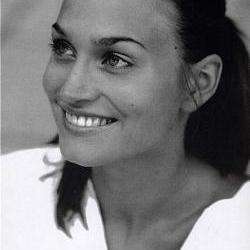Lotte de Beer’s new production of Tchaikovsky’s The Maid of Orleans at Theater an der Wien seems intent on squeezing as many ideas as possible onto the stage. Tchaikovsky’s self-written libretto, based on Schiller’s play, is not primarily concerned with historical accuracy. Instead, it poses the question, “What would have happened if Joan of Arc, after dedicating herself and her soul to God and country, had fallen in love?” Is this a ridiculous question? Absolutely. But Tchaikovsky was a product of his time, and no story centred around a woman in the 19th century could possibly fail to insert a man as a central plot point. Even Disney did not manage to feature a female protagonist who ended up without a love interest until 2003... and she was a fish named Dory.
De Beer’s response is to scrawl “feminism” in the margins of every page. Our protagonist, Johanna (Lena Belkina), is introduced when walking in on her father getting it on with a much younger woman on the kitchen counter. She is hauled out of her suburban slumber into a leadership role by a group of feminist tropes, including an early 90s Madonna, members of Pussy Riot and turn of the century suffragettes waving “Votes for Women” flags, just in case anyone missed the message. A moment of weakness where she very briefly canoodles with Lionel (Kristján Jóhannesson) leads to highly visual slut-shaming; blood-stained bedsheets pulled into banners filling the stage before Johanna is stoned and then burned to death. The corps de ballet (Kinderballett Dancearts) are young girls in pink dresses attending a cotillion, accompanied by their fathers. The men, clad in plaid, are portrayed as caricatures, hardly human, with the exception of Dunois (Daniel Schmutzhard) and Lionel. Thibaut d’Arc, Johanna’s father (Sir Willard White) is oppressive, King Karl (Dmitry Golovnin) is a brassy incompetent constantly making out with Agnès Sorel, a girlfriend half his age (Simona Mihai). The Archbishop (Martin Winkler) is a drunk blowhard and Johanna’s fiance, Raimond (Raymond Very) fades into mopey nothingness while she barely acknowledges his existence.
The elaborate and attractive stage design, by creative duo Eddy van der Laan and Pepijn Rozing (AKA Clement & Sanôu), melds elements of modern living with fantastic, sometimes nightmarish landscapes filled with larger-than-life dresser drawers and atmospherically lit (Alessandro Carletti) trees with leaves of changing colours. Circus artists (Helena Sturm and Sebastijan Geč) somersault through the air in harnesses to open the third act, foreshadowing Johanna and Lionel’s private battle (choreography: Ran Arthur Braun). It is all very easy on the eyes, although pondering what it is all supposed to mean is a recipe for a migraine. Is Johanna a hormonal teenager who has had a psychic break and delusionally believes herself an historical heroine? Is it all an Alice-like, fantastic dream about coming of age and facing our fears? Is it a parable about women and not being able to win in a man’s world? And what does any of this have to do with Tchaikovsky’s intentions or plot? Best not to think too much about it.
Musically, the Vienna Symphony shifted from sweeping, melodic legato lines to martial, rhythmically driven motifs on a dime under the baton of Oksana Lyniv. While I have perhaps heard them play more lushly, Lyniv did an excellent job of holding back their dynamic tide, giving the singers a chance to carry. Vocally there are not many complaints to be made about the casting. Young ensemble member Kristján Jóhannesson was a standout, and Daniel Schmutzhard was likewise lovely. Martin Winkler was clearly undercast in his role, oversinging as perfectly as he overacted. White and Golovnin were respectively boomy and metallic; vocal caricatures of their roles. Belkina was competent in the title role, but unfortunately not a revelation. Tchaikovsky initially wrote the role for a dramatic soprano, and this rewrite for a mezzo is not particularly friendly to the singer, but neither did this Johanna provide the variety of colour or the sensitivity of phrasing which make an audience fall in love with a heroine. As such, she got a bit lost in the action, a fate which befell others of the cast as well. Not so the Arnold Schoenberg Choir (direction: Erwin Ortner), who rose to the occasion vocally and scenically with a brilliance that has become synonymous with their name throughout their tenure at the house.
For both the visually and the musically minded, there is much to recommend about this production at Theater an der Wien; one should simply not expect much correlation between the two.




